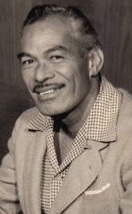- Aloha Punaluʻu,
I ka ʻehu kai- Ke kai kokolo aʻo Puʻumoa
- Me ka wai kaulana, aʻo Punaluʻu
Ka wai punapuna
Aʻo Kauwila
- He uʻi nā moku, aʻe kau mai nei
- Kaulana kou inoa
I ka poʻopaʻa
Mai poina iā Kōloa, aʻe kou inoa
Ka home hānau
O ka ʻiliʻili
Hoʻi aku wau ia Nīnole
I ka wai hu`ihu`i
Mai ke kuahiwi
Haʻina ʻia mai ana ka puana
Aloha Punaluʻu
I ka ʻehu kai - Ke kai kokolo aʻo Puʻumoa
- This love of Punaluʻu
With the mist of the sea-spray spread- And the creeping waves at Puʻumoa
- Then by the water place at Punaluʻu
The spring water spurting like fountains
At Kauwila
The beauty part of the reef awaits
Which is the famous place
Where poʻopaʻa fishing is good
This unforgettable and famous place, Kōloa
The home and birthplace
Of the pebbles
As I enter at Nīnole
There the cool water f
F rom the mountain
This is the end of my version about
This love of Punaluʻu
With the mist of the sea-spray spread - And the creeping waves at Puʻumoa

George Kealoha Iopa, Sr.
George Kealoha Iopa, Sr. was born February
22, 1913, to John Henry Iopa and Hannah Lehelona Mahelona. Known
as "Duke" or "Keoki" to his ʻohana and close friends, he lived
in Punaluʻu and took care of his blind uncle, Aqiu. He
was a taxi driver at the very young age of 14-16 years and also
helped train horses in Kaʻū, at the home of his ʻohana, breaking
in the horses on the black sand beach at Punaluʻu. He was a bookworm,
loved
reading and education was very important in his household. He
was very
poetic and loved
to write songs about the things he saw and places he had visited.
His compositions expressed his love and appreciation for things
we take for granted, i.e. sitting
under
a coconut tree
or
on the lava rock. George
and his very close friends, Samuel Kaluna, Mack Kailiawa, Fred
Punahoa, Fred Kaapana (Ledward and Nedward's father), Sam Lupinui,
George Napoleon, Tom and David Kanakaole, shared good
times and were a part of his composing this song on the black sands
of Punaluʻu. During those days the black sands were high hills
and on the
top of those hills were canoe shacks. George loved
this area and always told his family, "whenever
you feel sick, go to the coast of Punaluʻu and breathe in
the ʻehukai of the salt breeze. You will feel
healthier
and happier. He hated laziness, was a very hard worker and
always said, "in Hawaiʻi, there's no way you will be hungry,
there
is so much food that surrounds
us. All you need to do is get up and go get it." Fishing was plentiful
in
those days and the coastline was filled with enough food to fill our
stomachs, such as ʻopihi,
hāʻukeʻuke, ʻōkole, nehu, limu kohu, wana,
etc.
The
people
that
lived at Punaluʻu were all considered ʻohana. During the day some of the
people went
fishing in their canoes and some trained their horses on the black sand beach.
During the evenings there was always music that echoed through the night
air. The composer taught Sam Kaluna's daughter, Kalei Kaluna to sing this
song. She (Kalei) was the song bird of Punaluʻu; her voice was so sweet and
she was able to place every haʻi (slur) of the song in the right place.
This information is from Velma Kaleinaalapuaokalani Iopa Warfield, the only
daughter of George Kealoha Iopa, Sr. and Alice K. Iopa.